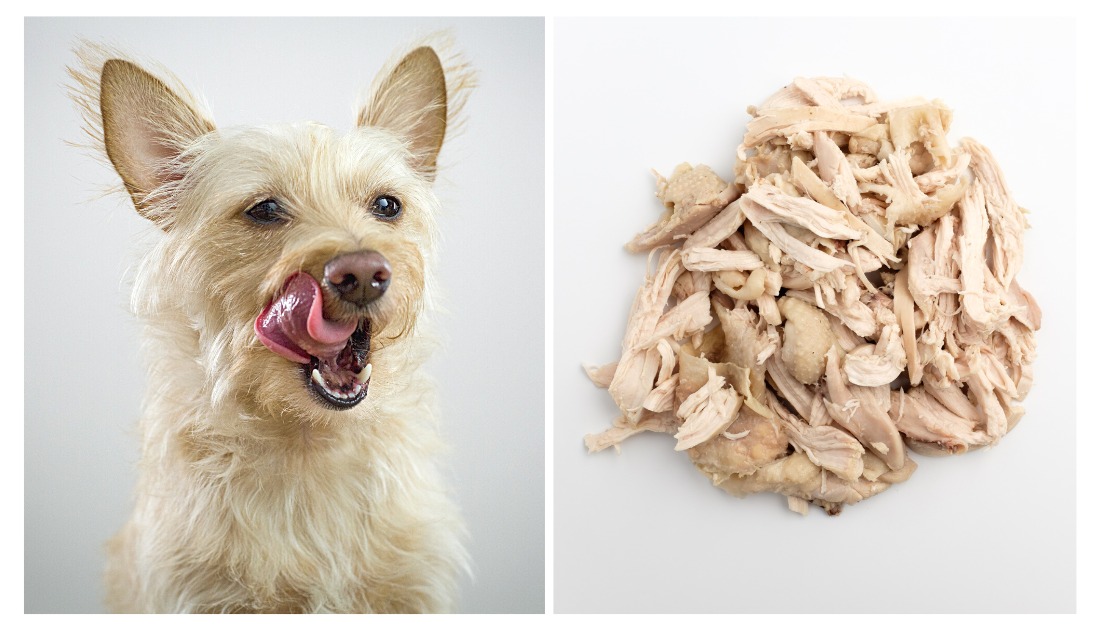When preparing chicken for your dog, you might wonder: “Is it safe for dogs to eat chicken skin?” While it’s tempting to toss leftover scraps to your pup, chicken skin comes with more risks than rewards. In this article, we break down the nutritional facts, potential dangers, and expert recommendations surrounding this common question.
Can Dogs Eat Chicken Skin?
Technically yes, but it’s not recommended. While chicken skin isn’t toxic to dogs, it’s very high in fat and can cause health problems — especially if consumed regularly or in large amounts.

Why Chicken Skin Isn’t Ideal for Dogs
Here are the key concerns with feeding chicken skin to your dog:
1. High Fat Content
Chicken skin is rich in saturated fat, which can:
- Lead to weight gain
- Trigger pancreatitis (a serious, painful condition)
- Cause digestive upset, including vomiting and diarrhea
Even a small portion of chicken skin can be risky for small breeds or dogs with sensitive stomachs.
2. Seasoning and Additives
If the chicken was seasoned or cooked with oil, garlic, onion, or spices, the skin becomes potentially toxic. Garlic and onion — even in small amounts — can damage red blood cells and lead to anemia.
3. Cholesterol and Long-Term Risks
Frequent consumption of fatty scraps like chicken skin may contribute to:
- Obesity
- Heart strain
- Joint problems due to excess weight
When Chicken Skin Might Be Especially Dangerous
Some dogs are more vulnerable to high-fat foods:
| At-Risk Dogs | Why It Matters |
|---|---|
| Small breeds | Smaller body weight = greater impact from fat overload |
| Senior dogs | Lower metabolism, weaker digestion |
| Dogs with pancreatitis history | High-fat foods can cause dangerous flare-ups |
| Overweight dogs | Chicken skin adds empty calories |
| Dogs with liver or kidney issues | Fat puts extra strain on organs |
Safer Alternatives to Chicken Skin
If you want to treat your dog, skip the skin and consider these healthy options:
- Boiled, skinless chicken breast
- Dehydrated chicken strips (no additives)
- Cooked pumpkin, sweet potatoes, or carrots
- Vet-approved dog treats low in fat
Tip: Always serve treats in moderation—less than 10% of your dog’s daily calories should come from extras.
What Do Vets Say About Chicken Skin?
Veterinarians agree: it’s best to avoid feeding chicken skin to dogs. While one small piece may not cause harm, the potential risks — especially for dogs with existing health conditions — outweigh the nutritional value.
If your dog accidentally eats a large amount of chicken skin, especially if it was seasoned or cooked in oil, contact your vet immediately.
Final Verdict: Is It Safe for Dogs to Eat Chicken Skin?
Chicken skin is not toxic, but it is unsafe in most cases. Its high fat content and potential for harmful seasonings make it a poor choice for canine health. Stick to plain, skinless chicken meat for a safe and nutritious treat.
When in doubt, always consult your veterinarian — especially if your dog has dietary sensitivities or underlying health concerns.